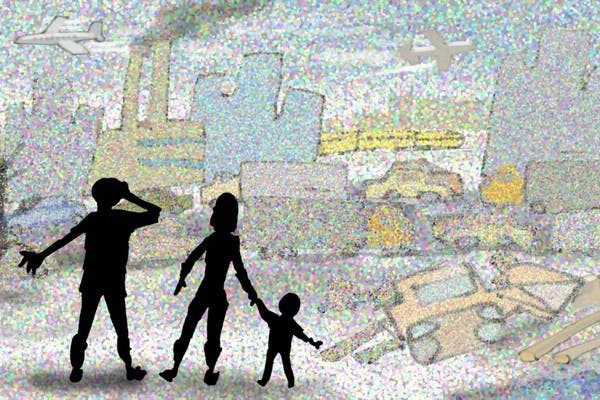Published: 27 September 2019
Last updated: 4 March 2024
- Abraham Joshua Heschel, The Sabbath
ONE OF MY STRANGEST experiences when I was active in a student environmental organisation (Green Course) was our raid on shopping malls in Beer Sheva during a Buy Nothing Day (BND), an international day of protest against consumerism.
As we were going up and down the escalators urging passers-by to abandon the consumption culture and devote themselves to what really matters, I couldn’t stop thinking that there already was a ‘Buy Nothing Day’ that occurred every week.
On this day, I consciously leave the world of “doing”, refrain from consuming and dedicate myself to family, community and spirituality. This day has an impact on my life far greater than a once-a-year, self-righteous BND.
Years later, a similar thought crossed my mind when a famous advertiser that became environmentally concerned spoke to me about an idea he was promoting. It was to place stickers on cars that read: this car does not pollute the environment on day X, meaning that on that day the car was parked. Once again, I wondered how this innovative idea was not tied to the fact that there are indeed many cars that are not used for 25 hours in the course of a week.
Sadly, in today’s Israel, the concept of Shabbat is lost between religious people who resist applying the language of Shabbat into the current social activism discourse, and secular people who are afraid of any attempt to impose Jewish concepts in Israel’s public sphere.
However, we have in recent years heard new voices calling for the positioning of Shabbat as a foundational model for a progressive society. These initiatives are labelled “Israeli Shabbat”.
Here are a few ideas that come out of this concept:
A weekly day of rest is already an accepted notion around the world. But the Jewish (Israeli) Shabbat offers more than rest. Shabbat offers a day when people are also free from production and consumption and can focus on self-fulfilment in areas that are typically pushed aside in the race for materialistic achievements.
Shabbat offers a day when people are also free from production and consumption and can focus on self-fulfilment in areas that are typically pushed aside in the race for materialistic achievements.
Both the blind belief in economic growth as a key to progress and the practice of unrestricted consumption need to be examined. The high pace of growth and consumption has turned the dream of progress into a nightmare, not to mention those who cannot participate in the shopping extravaganza.
Vulgar consumption leads to a vulgar consumption of time and a dramatic change in the pace of life. Work hours are longer and leisure time for family, friends and community dwindle.
This pattern can also take place on Shabbat, when consumerism can be seen as self-fulfilment, quality time with the children or socialising with friends. Shabbat designed as a day of rest from consumption has the potential to create a space for the real values behind these words. This would restore the classical meaning of Shabbat, Shamor Ve’zachor (keep and remember), cease and renew, and so on, an opportunity to taste the “world to come”.
Another central value in a democratic system that can be enhanced by Shabbat is freedom for the individual. In this regard, “freedom” is not liberation from restrictions and prohibitions but rather freedom for – an encouragement to create, to insert meaning to time and space.
As a collective day of rest, Shabbat can become a domain of social justice, since by reducing consumption people will work less and regenerate. Moreover, the people who tend to work on days of rest tend to be from lower socio-economic strata. The design of an Israeli Shabbat will provide opportunities for free choice and quality leisure time, and by doing so strengthening individuals, families, communities and local economies.
As a collective day of rest, Shabbat can become a domain of social justice, since by reducing consumption people will work less and regenerate.
My dream is that Israel will have a public policy that will set boundaries and set distinct time frames enabling a true day of rest, free of labour, production and shopping; a day that the market economy does not rule; a day that is protected from economic activity and unfair competition.
On the local level, there should be a discussion on how to construct Shabbat in a fashion that will not stand in the way of local trade and local economy, and secure a lifestyle that meets basic human needs and an enhanced quality of life.
Viewing Shabbat in such a way will alleviate the image of Shabbat in Israel as a problem that needs to be solved by compromises and political arrangements.
Shabbat, as described here, is a part of a solution, of a real Tikkun (rectification) in Israeli society. Shabbat is one of the great gifts that Judaism has given to humanity. In the modern State of Israel, we can elevate the value of this gift and renew its meaning.
Special thanks to Dr Jeremy Benstein, board member of Teva Ivri, for his inspiration
Illustration: Avi Katz




